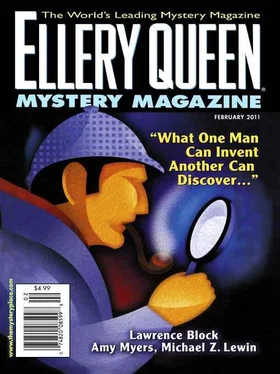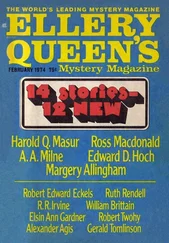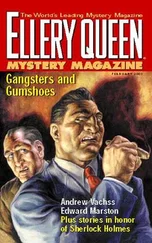Lawrence Block - Ellery Queen’s Mystery Magazine. Vol. 137, No. 2. Whole No. 834, February 2011
Здесь есть возможность читать онлайн «Lawrence Block - Ellery Queen’s Mystery Magazine. Vol. 137, No. 2. Whole No. 834, February 2011» весь текст электронной книги совершенно бесплатно (целиком полную версию без сокращений). В некоторых случаях можно слушать аудио, скачать через торрент в формате fb2 и присутствует краткое содержание. Город: New York, Год выпуска: 2011, ISBN: 2011, Издательство: Dell Magazines, Жанр: Детектив, на английском языке. Описание произведения, (предисловие) а так же отзывы посетителей доступны на портале библиотеки ЛибКат.
- Название:Ellery Queen’s Mystery Magazine. Vol. 137, No. 2. Whole No. 834, February 2011
- Автор:
- Издательство:Dell Magazines
- Жанр:
- Год:2011
- Город:New York
- ISBN:ISSN 0013-6328
- Рейтинг книги:5 / 5. Голосов: 1
-
Избранное:Добавить в избранное
- Отзывы:
-
Ваша оценка:
- 100
- 1
- 2
- 3
- 4
- 5
Ellery Queen’s Mystery Magazine. Vol. 137, No. 2. Whole No. 834, February 2011: краткое содержание, описание и аннотация
Предлагаем к чтению аннотацию, описание, краткое содержание или предисловие (зависит от того, что написал сам автор книги «Ellery Queen’s Mystery Magazine. Vol. 137, No. 2. Whole No. 834, February 2011»). Если вы не нашли необходимую информацию о книге — напишите в комментариях, мы постараемся отыскать её.
Ellery Queen’s Mystery Magazine. Vol. 137, No. 2. Whole No. 834, February 2011 — читать онлайн бесплатно полную книгу (весь текст) целиком
Ниже представлен текст книги, разбитый по страницам. Система сохранения места последней прочитанной страницы, позволяет с удобством читать онлайн бесплатно книгу «Ellery Queen’s Mystery Magazine. Vol. 137, No. 2. Whole No. 834, February 2011», без необходимости каждый раз заново искать на чём Вы остановились. Поставьте закладку, и сможете в любой момент перейти на страницу, на которой закончили чтение.
Интервал:
Закладка:
And, indeed, two of his criminals lived here. One at 1228 and the other only a few houses away and just around a corner.
Powder had five criminals on his list. Well, technically they were suspects, but nobody with half a brain could think of them as anything but self-advantaging, selfish liars and defrauders of the public purse. Criminals.
When Powder spotted 1228, he pulled up across the road. He took an envelope and a clipboard from his passenger seat. He put on a Colts cap and a pair of sunglasses. Then he got out and went to the door and rang the bell.
It was answered by a woman in a bright red-and-white gingham pinafore. How many wives — even those without their own jobs — wore that sort of thing these days? It was sort of nice to see: rather reassuring and traditional. Powder hadn’t often talked about personal things with Barry Haller, but even so he had the impression that Haller was a traditionalist where women were concerned. That they should be homemakers and child-raisers, cake-bakers and churchgoers, present-buyers and clothes-finders. PTA members and neighborhood morals-vigilantes? Lordy, it bored Powder just to think about it. He wondered if it bored Mrs. Haller too. Maybe she took regular drags on the cooking sherry.
Still, she opened the door to the stranger halfway, rather than peeping through a crack. That meant she was confident in her own house. And maybe trained in martial as well as marital arts? Or was it that she held a pistol behind the door in the hand Powder couldn’t see?
“Hi, ma’am,” he said. “I have a letter for Barry Haller that he needs to sign for.” Powder held up the clipboard. The envelope was resting on it.
The woman tilted her head. She frowned, but just for a moment. “I’ll sign for it,” she said. “I’m Mrs. Haller.”
“Oh, I do wish you could, ma’am. Unfortunately it needs to be signed for by Mr. Haller himself.”
“Well, he’s not here right now.”
“Is he expected back soon?” Powder looked at his watch.
“I’m not real sure.”
“I could wait. I mean, out there, o’ course.” Powder gestured to his car. “Or I could come back later on.”
“It may be a long time.”
Powder’s faced wrinkled in sympathy. “He hasn’t split the sheet with you or nuthin’ like that, has he, ma’am?”
“Oh no. Good heavens. He’s just out, with some friends.”
“This time of day? Well, nice for some.”
“Confidentially,” Mrs. Haller said, “I’m not really supposed to say where he’s gone.”
“Ah,” Powder said with a smile. “It’s a secret. Out gettin’ you a fancy anniversary present? Or is it your birthday?”
“No, no.”
Her statement was meant to be a finish to the conversation but Powder just stood and waited.
In a way, it was sad that doing nothing more than maintaining eye contact could intimidate the woman. But there it was. When she saw that Powder wasn’t going to leave, she shrugged and said, “Between you and me, it’s the first day of deer season.”
“Ah.”
“He managed a day off from work to go to Hancock County with some of his buddies.”
“I got it now, ma’am,” Powder said, truthful in more ways than one, because he’d been recording the conversation on a small recorder taped to the underside of his clipboard. “Well, tell you what. Why don’t I just go back to base and find out if you can sign for the letter yourself after all. I’ll explain the situation to my boss. I expect she’ll understand.”
The boss Powder was referring to wasn’t really his “boss” but she did understand.
Although Carol Lee Fleetwood worked in the Indianapolis Metropolitan Police Department’s headquarters downtown, she was now a civilian. A paralyzing bullet near her spine ended her short but distinguished field career, even in this age of ramps and access. Still, in Holland they hire blind police officers because they’re better at telling recorded voices apart, and as soon as Fleetwood had regained consciousness she declared her determination to continue police work. She might not be blind, but she was smart. There had to be a place for smart in IPD, as it was then. IMPD now. Somewhere.
“Somewhere” eventually turned out to be in Human Resources, formerly known as Personnel. And once she found her slot there she rose to become, effectively, the top dog — some said bitch — in IMPD HR. Politically sensitive — and vulnerable — officers of high rank might establish the department’s general personnel policies but it was Fleetwood who made the policies work — if they could work. She wasn’t quite able to make silk purses out of any old policy-sow’s ear, but she had a track record for making purses of cotton or even satin from the basest policy materials. Nowadays it seemed that HR could hardly do without her.
“Roy Powder,” she said when he walked into her office without knocking. She gave him a smile that crossed the years. “Well, well, well.”
“Long time no wheel your chair,” Powder said.
“You never wheeled me.”
“It did sometimes feel like it was the other way round, I admit.”
They had worked together for a while in the then Missing Persons Department. They had also shared some personal time. But that was long ago and in another emotional country.
“How are you adjusting to work in the provinces?” she asked.
Powder’s assignment as a roll call lieutenant was, in career terms, a demotion. He was no longer a detective and, more important to the many who couldn’t stand him, he no longer worked downtown at Indianapolis’s law-enforcement hub. But like Fleetwood, Powder had an intense commitment to effective policing. Even the most political members of IMPD would be hard put to assign him somewhere he didn’t think he could improve. “North is good,” he said. “I like getting the chance to help the kids become better policemen.”
“And policewomen.”
A flicker of a smile indicated that Powder’s failure to include both genders had been intentional, intended to provoke just the response from her that it had gotten.
Fleetwood sighed, perhaps reminded of Powder’s downside. “So what brings you here that you couldn’t have sent in on a postcard?”
“It’s all e-mail these days. When was the last time you got a postcard?”
“I was trying to talk in language that wasn’t too up-to-date for you, Roy.”
“Ah, I was being matronized. But I’m into the new technologies now, Chair Girl. I admit, I hesitated at first, but then I decided if you can’t beat ’em, join ’em. And now I love all the new machines. We can do so many things easily that were hard or impossible in olden times.” From a pocket he brought out the recorder that had been under his clipboard. He placed it on her desk.
When she refused to ask what it was and what it was for, Powder looked around the small office. Then looked around it again.
“Lost some marbles?” she asked.
“I just figured you’d have another wheelchair somewhere. For visitors to use, so we could all speak on the same level. No?”
“I don’t need to tower over you to fire your ass,” Fleetwood said.
Powder allowed himself a grin as he took one of the conventional chairs that was available for visitors.
“So are you well, Roy? I mean physically. I can’t believe they’ve invented a cure for what ails your mind.” Fleetwood leaned back and the wheelchair she sat in tilted with her.
“Me? Oh yeah, sure. And you? Walkin’ tall?”
“As ever.”
“As a matter of fact, you are looking good.”
“Despite the added years?”
“I don’t pay attention to years. You just look... settled. Yourself.”
Читать дальшеИнтервал:
Закладка:
Похожие книги на «Ellery Queen’s Mystery Magazine. Vol. 137, No. 2. Whole No. 834, February 2011»
Представляем Вашему вниманию похожие книги на «Ellery Queen’s Mystery Magazine. Vol. 137, No. 2. Whole No. 834, February 2011» списком для выбора. Мы отобрали схожую по названию и смыслу литературу в надежде предоставить читателям больше вариантов отыскать новые, интересные, ещё непрочитанные произведения.
Обсуждение, отзывы о книге «Ellery Queen’s Mystery Magazine. Vol. 137, No. 2. Whole No. 834, February 2011» и просто собственные мнения читателей. Оставьте ваши комментарии, напишите, что Вы думаете о произведении, его смысле или главных героях. Укажите что конкретно понравилось, а что нет, и почему Вы так считаете.












